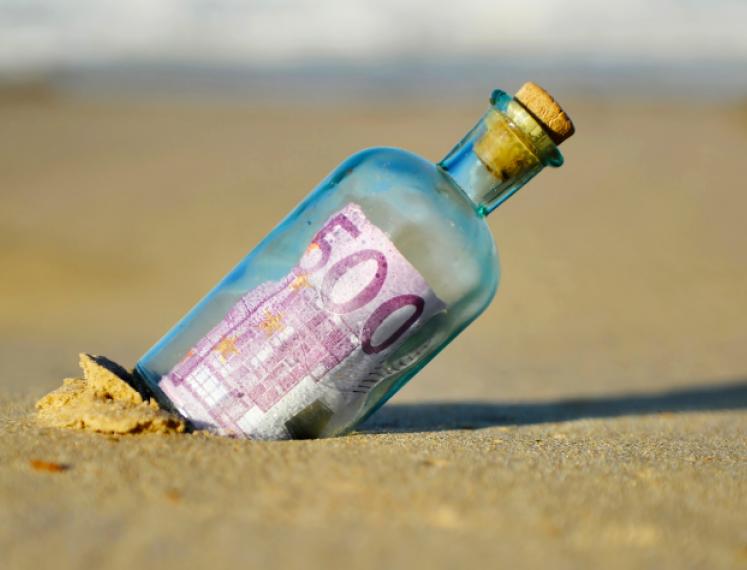
Tax Avoidance: Why Do We Care?
In Let’s Ask, we ask Groninger researchers to shed light on a current theme. In the online edition of December 8th, we asked Konstantin M. Wacker everything about tax avoidance. How does it work? Is it legal? And if so, does legality also imply that it’s fair?
Tax evasion has been a hot topic lately. Leaks such as the Paradise Papers and more recently, the Pandora Papers exposed the secret offshore activities of companies such as Apple, but also well known individuals such as Bono, Queen Elizabeth and our own former minister of finance, Wopke Hoekstra. Why is this revelation important and why should we care?
Wacker starts off with the question why we care about taxes. Why is it important that taxes are being paid and why do we care about tax evasion? Using tax money, governments finance public goals such as education, national security and health care and it stimulates innovation such as solar panels. Also, tax money is being used to tackle urgent problems in society. For example, without tax revenues we would probably not have had vaccines against the corona virus yet and even the internet is originally funded with tax money, as it originated as a military project. Besides, well developed countries use a part of the tax revenue to solve problems in the field of social justice: to compensate for bad luck, e.g. to support businesses that are being affected by the corona measures.
Research shows that richer countries generate higher tax revenues. So paying high taxes is not necessarily a bad thing. Wacker shows who actually pays taxes: in the Netherlands (and most countries), the majority is being paid through personal income taxes and VAT. Corporate income taxes and taxes on property are relatively low. The share of income that is being taxed is relatively equal, however, we can notice a significant difference. As Waren Buffett once said: “I pay a lower tax rate than my secretary”. Research shows that the ultra-rich pay relatively less tax. How do the ultra-rich manage to do that? Well, by shifting a part of their wealth to another place or business, in other words, they park their money in tax havens. Is that a bad thing or is it just a business skill?
The border between crime and business skill is blurry. Wacker shows the Apple case: Apple evaded taxes in Ireland and had to pay back 13 billion dollars, as the judge decided that this was illegal. However, Apple appealed and the court settled in favor of Apple. The Irish minister of finance celebrated the outcome as a success. Why? And how does avoidance work? Wacker illustrates this by a fictive example of a company based in the US. It designs a product that has its own royalties and legal rights for the design. They create a license and sell that to a shell company in a tax haven like Ireland. This shell company is a 100% subsidiary of the parent company, a so-called mailbox company. The parent company then sells its products, for example to a customer in the Netherlands. The customer pays for the product to the parent company in the US. Now, the parent company has to pay licence fees to the shell company in Ireland. That lowers the profit in the US and increases the profit in Ireland, the tax haven. That is beneficial for the company, because they have to pay less corporate income tax in the US. Because of the fact that these licenses are sold within one company, they can stretch the prices they put on them, especially when an item is unique. It would be fair to tax the market value, but in this case, there is no market: the product stays within one company. That is where companies make their profit. This process is called ‘transfer pricing’. The Netherlands is one of the most well known hubs for tax avoidance and there is even a name for tax avoidance between the Netherlands and Ireland: the Double Irish-Dutch Sandwich. One of the most perverse examples of this practice was the way the Dutch railways company NS, which was owned by the Dutch state, avoided taxes. They stopped this method under pressure from the Dutch revenue agency.
So why do we care about tax avoidance? As we saw above, tax money is used to fund public goods. Tax avoidance has a bad signalling effect (why do I have to pay taxes when you don’t?) and it harms our trust in society, institutions and democracy. Besides, it defeats the ‘social justice’ argument of taxes. Mainly the ultra-rich and multinationals can avoid taxes, the more market power you have, and the easier it is to create shell companies to avoid taxes. The playing field is uneven: you need to be rich. And even becoming rich is ‘unfair’: most get rich by heritage, or by marriage (and many rich marry other rich people, so the wealth stays within a certain environment).
Wacker sums up his talk shortly:
- tax avoidance in itself is not a crime, yet evading taxes is
- the ability to avoid taxes mostly reflects some sense of (inherited) market power
He concludes shortly by addressing policy issues around tax avoidance and tax evasion. There’s currently a push to limit market power. That could be beneficial socio-economically and is something society asks for lately. In Wacker’s eyes, this is something that is politically feasible.
Let’s Ask is all about the questions from the audience, so one of the first questions in this session was: “Why do countries become a tax haven?” Wacker answers: “We see that many of them are small. The effective tax rate is low, but a company as Apple parks many profits there. So even though the tax rate is low, it is a huge tax bill for Ireland. They benefit in terms of tax revenue. For a large country, that doesn’t play much of a role.”
Someone else asks if the tax structure should not be changed and the mobile income be ‘defiscalised’. Wacker answers that there are some new rules by the OECD that propose a global minimum tax, for example. The following question relates to that: “What do you think about the global minimum tax deal and how should it be altered to become more effective?” Wacker answers: ‘I was very sceptical in the beginning, to be honest, but I have been convinced by people that have way more legal knowledge than I that this is really a breakthrough reform on international level, because it is very clear what the tax base will be. There is a multilayer structure where different countries can apply the taxes, so when Ireland doesn’t tax something, then the US could set tax on the part that Ireland skips. The problem is that there’s a whole industry optimising taxes, so they will always find loopholes. Still, there’s now an agreement for a common framework, so I am optimistic about that.” He also adds that there’s a problem with lower income countries, since this framework only works for the richer countries.
Can limited market power help? “We have to be more critical about mergers and acquisitions. We have young startups and they often get bought up by large firms. There’s corporate law that limits market power, but we should be more aggressive. There's a lot of research now on ‘killer acquisitions’ where pharma companies buy others to get rid of competitors and I think we have to be more aggressive in preventing that.”


